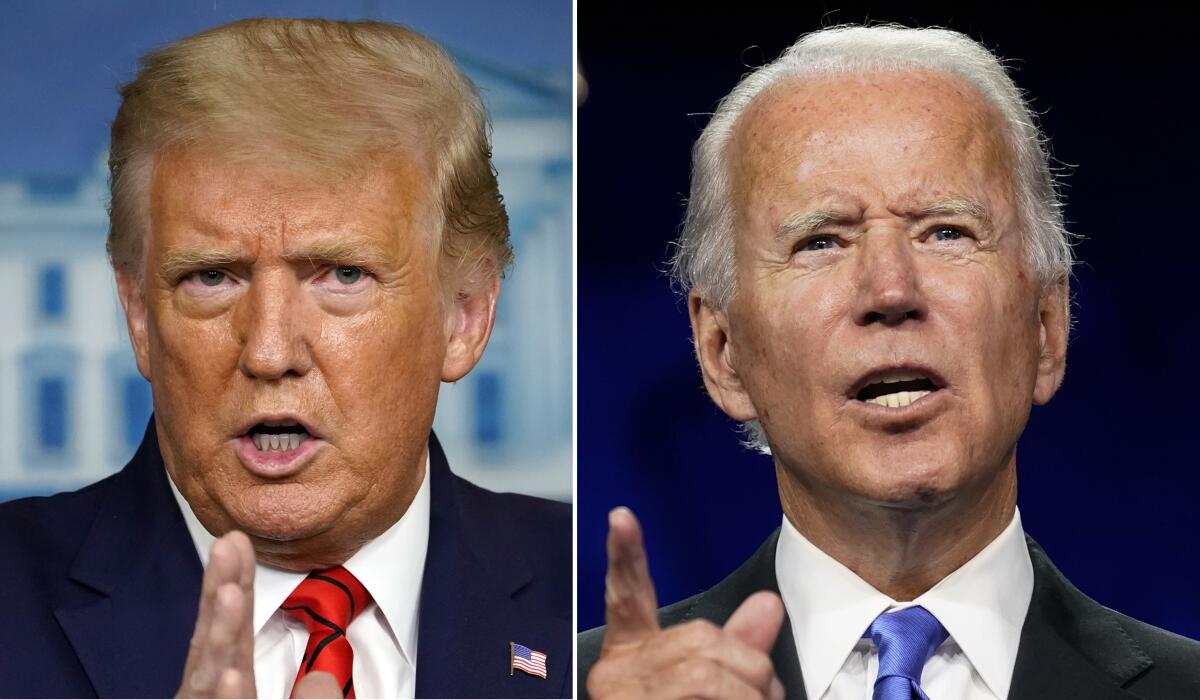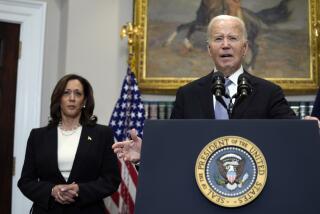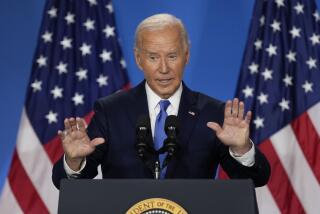The stakes in Tuesday’s presidential debate are high. Can Trump and Biden rise to the occasion?

- Share via
Donald Trump and I haven’t always gotten along. He doesn’t like me much and once tried to get me fired from Fox News. Nevertheless, I have dined with him in the Oval Office, spent a weekend at Camp David and agree with many of his economic policies.
I have also known Joe Biden for almost three decades. His son Beau was one of my favorite students, and Beau often drove me to his parents’ home in Delaware to talk politics. Though I fundamentally disagree with him on many issues, I appreciate Biden’s love for people and I will always be grateful for his sympathy after my stroke in January.
For the record:
4:12 p.m. May 25, 2021Frank Luntz: On the Sept. 28 Opinion page, a biographical note accompanying an article about a presidential debate said the writer, Frank Luntz, did not work for a political party in the 2020 election cycle. It has emerged that Luntz’s company did paid work for a political action committee led by Rep. Kevin McCarthy (R-Bakersfield), the House minority leader, in 2020.
The debate Tuesday is my Super Bowl. As a pollster, I am ethically and professionally required to interpret public opinion accurately, factually and without bias. But more importantly, as an American, I am terrified that the 90-minute encounter Tuesday night will reinforce the widespread perception that our democracy is toxic and our political system is broken beyond repair. The stakes — and the consequences — couldn’t be higher.
I’ve prepped about a hundred candidates and CEOs for debates and contentious interviews over the last 30 years. Here’s what I think each of the candidates could do to both capitalize on their strengths and have a debate that’s substantive and productive.
For Trump, the challenge will be to show he’s not simply an attack-machine. Rather than coming out swinging, he should ask questions, with the most crucial one being, “Who is Joe Biden?”
For Trump to win, it is imperative that he shatter the uneasy alliance between anti-Trump activist progressives and more traditional centrists — the coveted swing voters. The former group wants to hear Biden say he’ll lead the country in a bold new direction with progressive reforms. Swing voters are looking for a return to calmer times.
Trump should force Biden to explain where he stands by asking tough questions. “Why should we believe that you are any different from Bernie Sanders, Elizabeth Warren or AOC?” “How are you going to pay for the new programs you are proposing?”
The first debate gives Trump the opportunity to shift the focus from his presidency to Biden’s policies. But it also affords him one last chance to prove he listens and cares. By asking how Biden will pay for his litany of costly new programs, from healthcare to infrastructure, he can demonstrate concern for Americans in a place where it matters: their pocketbooks. Emphasizing costs also highlights one of his few real advantages over Biden: Many voters think he is a better steward of the economy than Biden would be.
Trump will also need to tweak his language. Up to now, his “law and order” language has not worked among independents. My company’s research suggests that “public safety” would be a far better way to frame the issue. It makes voters think of safe streets and neighborhoods, while “law and order” is reminiscent of police beating people with billy clubs.
What Trump should not do is attack Biden’s fitness. If the former vice president is having a bad night, viewers will see it with their own eyes. If he’s having a good night, any attacks will seem petty and unwarranted.
And then there is Trump’s strongest asset: Biden’s long record in government. He might address it with a single question: “If you have failed for 47 years, why should we expect success now?”
And what could Biden do to highlight his strengths and point up the president’s weaknesses? Channel Ronald Reagan, for starters.
In 1980, it was four words in a debate that propelled Ronald Reagan to the presidency and sealed the fate of Jimmy Carter: “There you go again.”
Since Trump seems incapable of speaking extemporaneously without misstatements, factual inaccuracies and inappropriate comments (calling women “housewives,” for example), Biden should have many opportunities to reprise that phrase. And he should.
Biden should approach the debate like a prosecutor before a jury — building a case, point by point, over 90 minutes, with one overarching theme: “Is this the record of someone who has earned four more years? Is this what you want for four more?”
Biden benefits most when voters compare the attributes and personalities of the candidates rather than their platforms. For the 94% of the country who have already made up their minds, policies matter. But for the crucial 6% who are stubbornly undecided, it’s much more about who the candidates are and less about what policies they embrace.
My company’s September polling also offers an interesting insight. A majority of Americans believe the country is worse off than four years ago, yet they themselves feel better off. Usually the two perceptions run parallel.
Since they don’t this year, Biden needs to nationalize the election rather than personalize it. On each issue — the pandemic, the economy, social justice, healthcare, draining the swamp — he should ask voters to consider: “Did Donald Trump make things better or worse for the nation?”
Trump doesn’t do empathy. Biden lives it. Trump has exploited and exacerbated divisions among Americans and Biden needs to hammer on that, noting that no one is happy with the poison and toxicity of our politics and asking them to imagine what four more years of it would mean.
Almost 100 million Americans will be watching Tuesday night to learn the answer to the question Ben Franklin was asked at the conclusion of the Constitutional Convention: What kind of government do we have? His answer: “A Republic if you can keep it.”
It’s now up to us to keep it.
Frank Luntz has conducted televised focus groups for major news outlets since 1996. He is not working for any presidential candidate or political party in the 2020 election.
More to Read
A cure for the common opinion
Get thought-provoking perspectives with our weekly newsletter.
You may occasionally receive promotional content from the Los Angeles Times.









